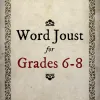Take a look inside 4 images
Word Joust for 6-8
Pros: Words come from grade-appropriate literature.
Cons: Vocab learned in isolation may not transfer into usage.
Bottom Line: Good tool for building general vocabulary.
There are no separate user accounts, so Word Joust for 6-8 is best used one-on-one. Since teachers and kids can't create custom lists, Word Joust for 6-8 could be used as a warm-up activity for other word-building exercises. The general word lists would be great for ELL/ESL classes.
Kids become knaves in a medieval joust where they can enter quests and learn vocabulary from a list of 3,000 age-appropriate words, or train by playing games with the words they've encountered in their quests. Each quest includes five unrelated words. Kids spend a moment studying each word and definition and are then tested by playing one of the games. Points decrease as time goes by, with fast, correct responses earning 15 points and slower responses earning fewer points, down to 5. Incorrect answers don't get a second chance.
Games include "Scramble" (unscrambling mixed-up words), "Troll Trickery" (matching word to definition), "Labyrinth of Letters" (a word search that is quite challenging), "Cohorts of Swords" (identifying the correct word as it crosses the screen), and "Hangman," which is played with a cartoon man being hung rather than a stick figure. In Training mode, kids can choose which game to play to practice words from their quest lists. Kids move up from infantryman to archer and so on. Mastered words and apprenticed words (those introduced but not yet mastered in the games) can be reviewed in Stats, and there's also a Global Leaderboard.
Word Joust for 6-8 is a fun way for kids to practice word skills and develop their vocabularies. The mix of five games is varied enough that kids can practice different skills and use their brains in different ways. The words and definitions reflect varied meanings that could be encountered in young adult literature. The short quests should easily hold preteen attention spans, and the increasing difficulty of words as kids master more quests will keep them challenged.
Kids will master words such as alligator, guitar, sympathy, correctly, and emperor. In some of the games, kids have to spell the words after seeing only the definition, which will improve spelling as well as vocabulary.













